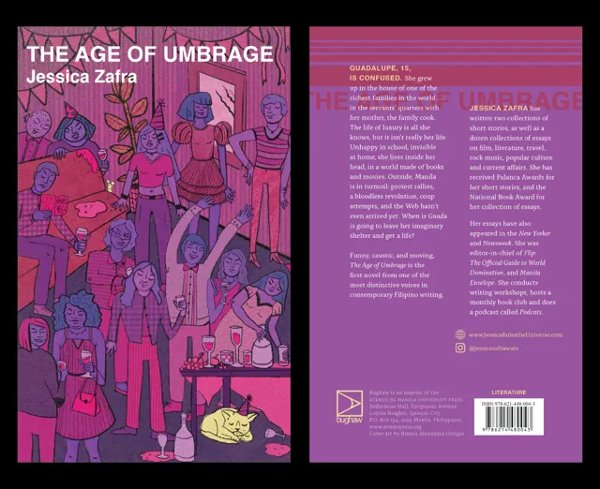Jessica Zafra has been known for her sardonic prose in her columns, particularly her film criticism, and her short fiction. So yes, it’s high time she came out with a novel that reflects that hers is THE ultimate voice of her generation.
The Age of Umbrage (is this title a bow to Edith Wharton’s The Age of Innocence?) is rife with history and drama, much like the American novelist’s famous work. Zafra casts her caustic eye on characters that look heavily drawn from real life like the protagonist Guada (the author’s alter ego, one supposes, considering her fondness for cats, her propensity for dressing up in all-black or Goth outfits, her voracious reading), her plump mother Siony who aspires for nothing more for her family than to migrate to the US and enjoy the opportunities that land is known for, the filty rich Almagro family, the bullies in school that make the mainstay’s life a purgatory, among many.

The author also paints a less than nostalgic picture of the era where the plot is situated—the mid- to late 1980s or shortly after the Marcoses were booted out of power and President Corazon Aquino tried mightily to hold on to the reins of power as the restive and politicized military attempt coup after coup to unseat her.
Witness this observation: “Rumors of coup d’etat surfaced every few weeks, and on two or three occasions there were actual attempts quashed by the loyal military. The coup plotters had hoped that the people would rally to their cause and form another million-body barricade the way they did outside the military camps in 1986, but they made a crucial miscalculation. They tended to hole up in five-star hotels, a wise choice from a logistical point of view—it’s hard to be heroic on an empty stomach—but a disaster in public perception—it’s hard to look heroic when you’re getting room service.”
Zafra is the master of the punch line, and there are many laugh-out-loud moments when reading her latest book. She points out, while Siony, who works as a cook in the Almagro household, indulges in panic buying of grocery items, how the fiesta mentality in the midst of siege defines the Filipino character.
She writes: “There is in the Filipino character a fiesta instinct which manifests itself with special ferocity in times of danger. It appears to have existed before the arrival of the Spanish colonizers—Magellan’s chronicler Pigafetta reported that the natives of the islands responded to the appearance of large, hungry white people with guns by throwing a party. It would be churlish, after all, to kill your hosts.”
Everywhere in the book there are these historical asides apart from the clipped dialogues between and among characters. Guada is a not just a character. She is one mighty girl with a wide vocabulary that intimidates her classmates. She can even be a role model. One can envision this debut novel to be quickly followed by a sequel featuring Guada metamorphosing into an unforgettable woman. One imagines Guada as the master of the putdown.
The language of the 126-page The Age of Umbrage (published this year and already into its second printing by Ateneo de Manila University’s Bughaw) is readable enough for it to be recommended for young adults. If this were a movie, there are, however, 16- and above-rated scenes like the fellatio incident in the Almagro mansion silently witnessed by Guada and the violent parting confrontation between her parents which she stoically takes in.
Someone like her develops a certain invincibility or an untouchable nature that braces for the loss of a parent. Perhaps her being a “head” person, a nerd, is a reason for that. At a time when children are playing with their bikes or Barbies, Guada is reading Tess of d’Urbervilles or Tarzan. This inner strength, also fueled by being a tireless diarist, prepares her for the loss—whether it is of Siony or losing her direction in the labyrinthine alleys of Quiapo at the end of the book.
At the online launch of the novel sponsored by Mt. Cloud Bookshop, Zafra described her writing habits—how she drafted her 1,000-word columns longhand in cafes, training herself to shut off the ambient sounds (“I write well in noisy places”). One’s worry for her is the lockdown brought about by the COVID-19 pandemic might have gifted her with too much silence and isolation. Are those conditions still conducive at all to the writing of the next novel, this time, one hopes, a thicker tome?
She is far from the young writer who once aped J.D. Salinger’s Catcher in the Rye. With The Age of Umbrage Zafra comes of age as full-blown story-teller.
